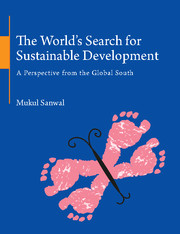Book contents
- Frontmatter
- Dedication
- Contents
- Preface
- Acknowledgments
- Abbreviations
- INTRODUCTION
- 1 Social Dimension of Sustainability
- CONSUMPTION IN AN UNEQUAL WORLD: FRAMING INTERNATIONAL COOPERATION
- 2 Geopolitics of the Global Environment
- 3 Natural Science – Policy – Institutions Interface
- 4 Focus on Developing Countries
- 5 Limitations of Multilateral Environmental Agreements
- CLIMATE POLICY: GLOBAL TO NATIONAL
- SUSTAINABLE DEVELOPMENT: NATIONAL TO GLOBAL
- CONSUMPTION IN A MORE EQUAL WORLD: SHAPING SOCIETAL FUNCTIONS
- GEOPOLITICS TO GEOECONOMICS: RURAL–URBAN DIVIDE, RATHER THAN BETWEEN COUNTRIES
- THE ASIAN CENTURY
- Index
3 - Natural Science – Policy – Institutions Interface
from CONSUMPTION IN AN UNEQUAL WORLD: FRAMING INTERNATIONAL COOPERATION
Published online by Cambridge University Press: 18 December 2015
- Frontmatter
- Dedication
- Contents
- Preface
- Acknowledgments
- Abbreviations
- INTRODUCTION
- 1 Social Dimension of Sustainability
- CONSUMPTION IN AN UNEQUAL WORLD: FRAMING INTERNATIONAL COOPERATION
- 2 Geopolitics of the Global Environment
- 3 Natural Science – Policy – Institutions Interface
- 4 Focus on Developing Countries
- 5 Limitations of Multilateral Environmental Agreements
- CLIMATE POLICY: GLOBAL TO NATIONAL
- SUSTAINABLE DEVELOPMENT: NATIONAL TO GLOBAL
- CONSUMPTION IN A MORE EQUAL WORLD: SHAPING SOCIETAL FUNCTIONS
- GEOPOLITICS TO GEOECONOMICS: RURAL–URBAN DIVIDE, RATHER THAN BETWEEN COUNTRIES
- THE ASIAN CENTURY
- Index
Summary
The way global expert organizations frame environmental issues determines what exactly the ‘problem’ is that needs to be assessed, shapes the discourse on how it should be ‘resolved’ and has framed the nature, scope and agenda of international environmental treaties.
The development of our understanding of the different dimensions of global environmental change, climate change and sustainable development requires a significant involvement of scientific expertise in policy formulation and implementation. While the international political process is open in procedural terms, it has been informed by consensual natural science to persuade officials to adopt certain policies in a manner that the debate, discussion and compromise reflects expert ‘consensus’ on the nature of the global environment and the ecosystem services it provides; the symptoms rather than the human activities that have caused the problem. The framing of natural resource use as environmental changes, which were in turn framed as global universal risks that demand collective action, is itself questionable because significant decisions can be taken at the national level. For example, if climate change risks were framed differently in terms of energy use rather than increase in global temperature then different forms of political action would have opened up, as is happening now with the China–United States deal on climate change, in November 2014, and the de-coupling of global emissions of carbon dioxide from economic growth, also in 2014, outside the multilateral climate treaty and markets.
The current framework delivered results in identifying global concerns till political decision making shifted to national policy implementation, which was very different from setting the agenda by identifying the extent of environmental damage and its impact on the economy and society to support universal solutions. Global environmental change, climate change and sustainable development stand out as areas where the industrialized countries successfully shifted attention from their consumption and production patterns of natural resource use by shaping the way the issues were defined in terms of global goods. They developed the global agenda in 1972 with the help of the scientific community and secured agreement of reluctant partners in developing countries. This framework has continued to shape international cooperation for 40 years and, with the re-emergence of China and India, is only now being challenged.
- Type
- Chapter
- Information
- The World's Search for Sustainable DevelopmentA Perspective from the Global South, pp. 34 - 71Publisher: Cambridge University PressPrint publication year: 2015



